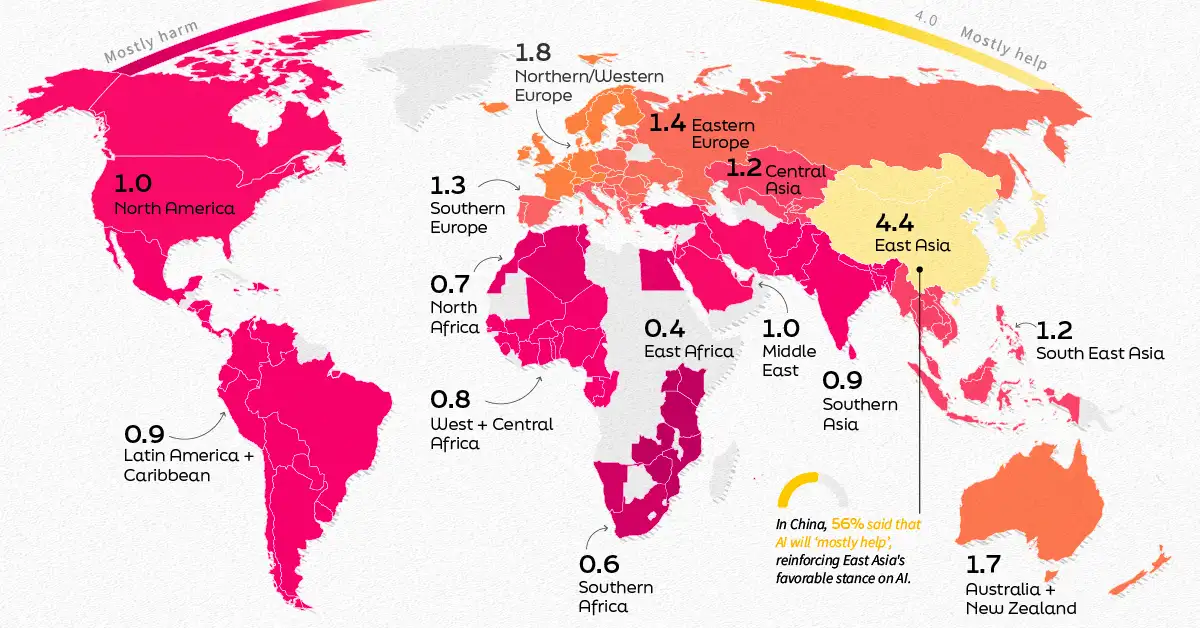Artificial intelligence (AI) is reshaping the global landscape—from workplaces and privacy frameworks to societal norms and economic futures. However, a Pew Research Center report from 2025 reveals that most adults worldwide now feel more anxious than excited about AI’s impacts, particularly concerning jobs and privacy.
This blog from Netdave-AI delves into global public sentiment regarding AI, uncovering deep-rooted concerns, trust disparities, and the nuanced mix of fear and optimism. Understanding these attitudes from an evidence-based perspective enables policymakers, developers, and businesses to address fears, build trust, and responsibly integrate AI into daily life.
The Pew Research 2025 Global AI Sentiment Report: An Overview
The 2025 Pew Research survey spans multiple continents and demographics, painting a comprehensive picture of how adults perceive AI’s role in society. Key highlights include:
- A majority express anxiety over AI’s potential disruption in employment.
- Widespread concerns about personal privacy erosion due to AI surveillance and data misuse.
- Divided trust in governmental and corporate ability to regulate and manage AI technologies.
- Varied AI awareness and optimism levels across countries, ages, and income brackets.
These insights reveal a populace wrestling with AI’s rapid integration amidst unknowns and uncertainties, yearning for transparent governance and ethical guidelines.

Why the Anxiety? AI’s Impact on Jobs
One of the most palpable sources of public unease is AI’s effect on employment. The report shows more adults worry about job displacement than feel hopeful about AI creating new opportunities. Factors fueling this anxiety include:
- Automation and Task Replacement: As AI systems increasingly automate routine and complex tasks, workers fear their roles may become obsolete, especially in manufacturing, services, and administrative sectors.
- Job Quality Concerns: Even when AI creates new jobs, questions about the stability, wages, and meaningfulness of these roles persist.
- Economic Inequality: Vulnerable workers with lower education levels or in precarious employment feel disproportionately threatened by AI adoption.
While AI proponents highlight job creation in AI design, maintenance, and new sectors, these benefits often appear abstract to the average worker confronting immediate displacement threats.
Privacy: The Double-Edged Sword of AI Awareness
AI’s data-hungry nature has amplified privacy fears globally. Adults express apprehension about how companies and governments collect, store, and use personal data, raising questions about:
- Surveillance and Profiling: AI-powered analytics can detect behaviors, preferences, and vulnerabilities, leading to concerns about intrusive monitoring.
- Data Breaches: The risk of sensitive information falling into malicious hands grows as data volumes increase.
- Opaque Algorithms: Limited transparency regarding how AI models use data creates mistrust around potential bias, manipulation, and misuse.
These privacy concerns influence people’s overall AI perceptions and willingness to adopt AI-driven technologies, underscoring the need for robust data governance frameworks.
Demographic and Regional Variations in AI Sentiment
The Pew report highlights significant differences in AI sentiment based on geographic, age, and socioeconomic factors:
- Geographic Differences: Higher-income and tech-forward countries exhibit more optimism and trust in AI regulation compared to developing regions, where apprehension is more pronounced.
- Age Gap: Younger adults tend to be more hopeful about AI’s benefits but share privacy concerns with older populations.
- Education and Income: Those with higher education and incomes report greater AI awareness and nuanced attitudes, balancing excitement with caution.
Understanding these variances is essential for targeted policymaking, public education, and technology deployment strategies that resonate across diverse communities.

Trust in AI Governance: A Global Challenge
Who governs AI and how effectively they do so influences public sentiment substantially. The report finds that:
- Many adults doubt their governments’ ability to regulate AI truthfully and effectively.
- Trust in technology companies to handle AI ethically remains low in several markets.
- Calls for transparent regulation, public involvement, and ethical AI standards dominate public discourse.
Building trust is not only about enforcing laws but also about engaging communities, fostering AI literacy, and respecting social values.
The Role of Misinformation and Education in Shaping Sentiment
Misinformation around AI capabilities and risks contributes to anxiety. Clear, factual, and accessible AI education is critical to:
- Demystify AI’s actual and potential impacts.
- Reduce unfounded fears by clarifying uncertainties.
- Empower individuals to make informed decisions about AI adoption.
Addressing misinformation involves coordinated efforts between governments, academia, industry, and media.
Balancing Fear and Optimism: The Future Outlook
Despite prevailing anxieties, many adults recognize AI’s potential to improve lives through:
- Enhancing healthcare and education access.
- Driving innovation and productivity gains.
- Automating hazardous or monotonous tasks, freeing human creativity.
The challenge lies in navigating this duality, ensuring AI development incorporates societal concerns and favors equitable outcomes.
Policy Recommendations and Best Practices
Given these evolving sentiments, experts recommend:
- Inclusive AI Regulation: Policies that balance innovation with privacy, workforce protection, and ethical standards.
- Public Engagement: Empowering citizens with AI literacy programs and participatory decision-making.
- Transparency in AI Systems: Clear explanation of AI decision processes to build trust.
- Data Protection Enhancements: Strong safeguards for personal data used in AI applications.
Effective governance will require global cooperation and multidisciplinary approaches.
Conclusion
The 2025 Pew Research report underscores a critical juncture for AI — where the promise of technological progress meets the reality of human fears. Understanding global AI sentiment helps stakeholders respond with empathy, responsibility, and foresight.
As AI continues integrating into daily life, addressing public anxieties around job security and privacy will be as important as advancing AI technical capabilities. The path to sustainable AI adoption lies in transparent governance, widespread education, and ethical innovation that respects diverse human values.
